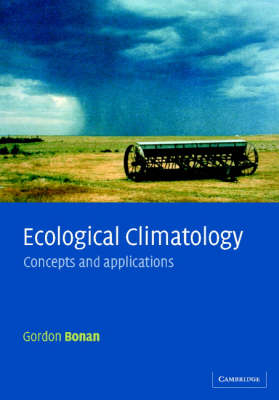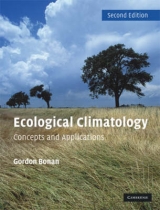
Ecological Climatology
Concepts and Applications
Seiten
2002
Cambridge University Press (Verlag)
978-0-521-80032-7 (ISBN)
Cambridge University Press (Verlag)
978-0-521-80032-7 (ISBN)
- Titel erscheint in neuer Auflage
- Artikel merken
Zu diesem Artikel existiert eine Nachauflage
Integrates aspects of ecology and climatology to examine the effect of land-use on climate change.
Ecological climatology is an interdisciplinary framework to understand the functioning of terrestrial ecosystems in the climate system. It examines the physical, chemical, and biological processes by which landscapes affect and are affected by climate. The central theme is that terrestrial ecosystems, through their cycling of energy, water, chemical elements, and trace gases, are important determinants of climate. The coupling between climate and vegetation is seen at spatial scales from stomata to vegetation geography and at time scales of near instantaneous to millennia. In particular, natural vegetation dynamics and human land uses and land management are important mechanisms of climate change. The boreal forest-tundra ecotone and the North African Sahel are examples of climate-ecosystem dynamics at the biogeographical spatial and temporal scale. Deforestation, desertification of drylands, cultivation of grasslands, reforestation following farm abandonment, and urbanization are case studies of how human uses of land alter climate.
Ecological climatology is an interdisciplinary framework to understand the functioning of terrestrial ecosystems in the climate system. It examines the physical, chemical, and biological processes by which landscapes affect and are affected by climate. The central theme is that terrestrial ecosystems, through their cycling of energy, water, chemical elements, and trace gases, are important determinants of climate. The coupling between climate and vegetation is seen at spatial scales from stomata to vegetation geography and at time scales of near instantaneous to millennia. In particular, natural vegetation dynamics and human land uses and land management are important mechanisms of climate change. The boreal forest-tundra ecotone and the North African Sahel are examples of climate-ecosystem dynamics at the biogeographical spatial and temporal scale. Deforestation, desertification of drylands, cultivation of grasslands, reforestation following farm abandonment, and urbanization are case studies of how human uses of land alter climate.
Gordon Bonan is a scientist at the National Center for Atmospheric Research, and an adjoint associate professor in the Program in Atmospheric and Oceanic Sciences at the University of Colorado. His research interests include the ecological and hydrological processes by which land affects climate and how natural and human-induced changes in landscapes affect climate. Gordon is an editor for the Journal of Climate.
1. Introduction; 2. Global climatology; 3. Climate variability; 4. Climate change; 5. Hydrologic cycle; 6. Soils; 7. Surface energy fluxes; 8. Surface climates; 9. Leaves and plants; 10. Populations, communities, and ecosystems; 11. Vegetation dynamics; 12. Climate-ecosystem dynamics; 13. Agroecosystems; 14. Urban ecosystems.
| Erscheint lt. Verlag | 13.6.2002 |
|---|---|
| Zusatzinfo | 68 Tables, unspecified; 41 Plates, color |
| Verlagsort | Cambridge |
| Sprache | englisch |
| Maße | 182 x 252 mm |
| Gewicht | 1650 g |
| Themenwelt | Naturwissenschaften ► Biologie ► Ökologie / Naturschutz |
| Naturwissenschaften ► Geowissenschaften ► Meteorologie / Klimatologie | |
| Technik ► Umwelttechnik / Biotechnologie | |
| ISBN-10 | 0-521-80032-3 / 0521800323 |
| ISBN-13 | 978-0-521-80032-7 / 9780521800327 |
| Zustand | Neuware |
| Informationen gemäß Produktsicherheitsverordnung (GPSR) | |
| Haben Sie eine Frage zum Produkt? |
Mehr entdecken
aus dem Bereich
aus dem Bereich
Planung · Recht · Verfahren
Buch | Hardcover (2024)
Springer Vieweg (Verlag)
64,99 €
Lehrbuch zu Grundlagen, Technologie und Praxis
Buch | Hardcover (2022)
Hanser (Verlag)
34,99 €



